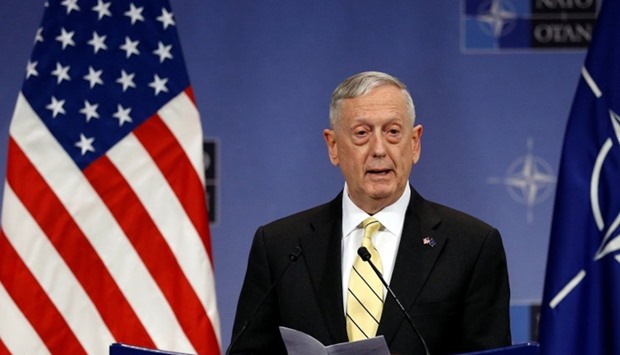‘We are not in a position right now to collaborate on a military level. But our political leaders will engage and try to find common ground,’ Mattis told reporters after talks at NATO headquarters in Brussels.
Asked whether he believed that Russia interfered in US presidential elections, Mattis said: ‘Right now, I would just say there's very little doubt that they have either interfered or they have attempted to interfere in a number of elections in the democracies.’
Mattis' remarks came shortly after his Russian counterpart, Sergei Shoigu expressed readiness to resume cooperation with the Pentagon and the same day Russian President Vladimir Putin said it was in the interests of both nations to restore communications between their intelligence agencies.
‘It's in everyone's interest to resume dialogue between the intelligence agencies of the United States and other members of NATO,’ Putin said, addressing Russia's Federal Security Service (FSB).
‘It's absolutely clear that in the area of counter-terrorism all relevant governments and international groups should work together.’
Mattis told a closed-door session of NATO on Wednesday that the alliance needed to be realistic about the chances of restoring a cooperative relationship with Moscow and ensure its diplomats could ‘negotiate from a position of strength’.
That prompted a terse reply from Russia's Defence Minister Sergei Shoigu.
‘Attempts to build a dialogue with Russia from a position of strength would be futile,’ Shoigu was quoted as saying by news agency TASS.
Mattis shot back: ‘I have no need to respond to the Russian statement at all. NATO has always stood for military strength and protection of the democracies and the freedoms we intend to pass on to our children.’
The back-and-forth was the latest indication from the Trump administration that rebuilding US ties with Moscow could be more difficult than Trump might have thought before his election.
US intelligence agencies concluded that Russia hacked and leaked Democratic emails during the presidential campaign as part of efforts to tilt the vote in the Nov. 8 election in Trump's favor.
Concerns over the extent of Russian interference have been magnified since Trump forced out national security adviser, Michael Flynn, on Monday.
Flynn resigned after disclosures he had discussed US sanctions on Russia with the Russian ambassador to the United States before Trump took office, and that he later misled Vice President Mike Pence about the conversations.
Congressional inquiries into alleged Russian interference in the US elections are gaining momentum as Capitol Hill investigators press intelligence and law enforcement agencies for access to classified documents.
The FBI and several US intelligence agencies are investigating Russian espionage operations in the United States.
They are also looking at contacts in Russia between Russian intelligence officers or others with ties to President Vladimir Putin's government and people connected to Trump or his campaign.

